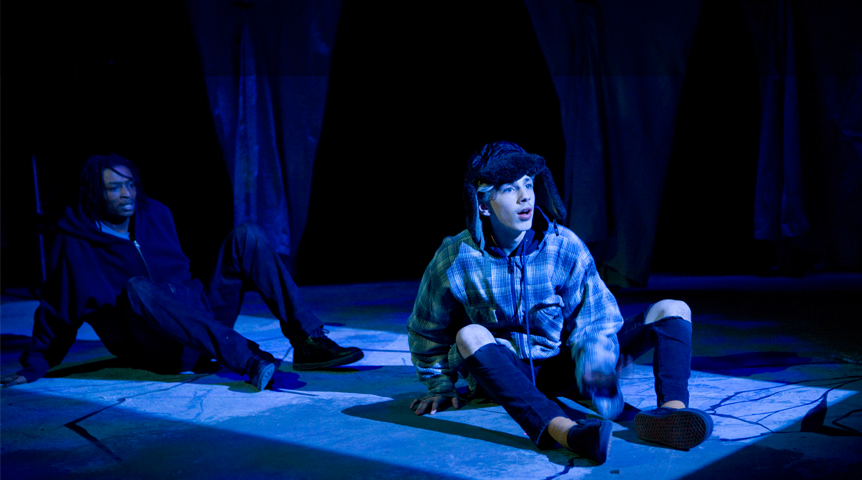Only students who have submitted a complete application will be granted an audition for admission to the ChiArts Theatre Department. Please visit the application pages for more information.
Students of all abilities and levels of experience may audition for admission into the Theatre program. ChiArts recognizes the need to provide opportunities for students who have high levels of theatrical training and for students who have not had training in a formal setting, but demonstrate strong natural ability and a desire to learn.
Backstage Passes will be held this fall to help students prepare for the audition process. Participation in the Backstage Passes is strongly recommended. Registration closes a week before each event.
This guide is also designed to help you prepare for the Theatre program audition and for considering ChiArts as an option for your high school. ChiArts is a wonderfully creative and educational environment, and we take our work seriously. The Theatre Conservatory consists of two majors: Acting and Musical Theatre. If you wish to be considered for both majors, you must audition for each program separately.
How to Audition In-Person for the Theatre Conservatory – Advice Video
How to Audition Virtually for the Theatre Conservatory – Advice Video
ACTING PROGRAM AUDITION REQUIREMENTS
- Monologue (90 Seconds long)
MUSICAL THEATRE AUDITION REQUIREMENTS
- Monologue (90 Seconds long)
- Song (60 seconds or 16 bars long)
VIRTUAL AUDITION REQUIREMENTS (Both Acting and Musical Theatre)
- Same requirements as above.
- Please submit a recorded video of your monologue (Acting & Musical Theatre) and song (Musical Theatre) via the provided virtual application.
AUDITION PREPARATION
As with all auditions, your primary responsibility is to be as prepared as possible. Start your preparation NOW. Be confident and believe in yourself! Every time that you audition, the people watching you are on your side and want you to do your best. Be passionate and unafraid to take creative risks.
MONOLOGUE (Acting & Musical Theatre)
- A monologue is a speech spoken by one person.
- It can be from a play, screenplay, short story, poem, or written by you. Students who are not sure about what to bring should select from our recommended list of monologues, which you can view here.
- Sample monologues can be found on the ChiArts website here.
- There is a 90-second limit – you must stick to this or you will be cut off.
- Your monologue must be memorized.
- The material should be age-appropriate – suitable for a pre-teen through high school age character.
- It is highly encouraged to bring a copy of your monologue to the audition for the adjudicators (1-2 copies).
HOW TO PREPARE YOUR MONOLOGUE
- Choose a piece that means something to you or that you can relate to. Select a piece that can be active, meaning your character wants something from someone. Pieces that simply tell a story generally are not active.
- Read the entire play, story, or poem so you know what is happening in this scene and what happened in the past leading up to this monologue. Know what you’re saying and why you’re saying it.
- Make notes in the piece about where something changes in the monologue, such as a new idea or a change in mood, and decide why this is happening.
- Rehearse the monologue out loud. A friend or family member can help you memorize by being “on book” (following along with the script while you are saying it) and helping you with trouble spots.
- Decide in advance who your character is, who you are speaking to in this monologue (this is called the “listener”) and where you imagine him/her/they are (the “environment”) when you are speaking to them. Rehearse by directing the monologue to the listener (Note: this will be an imaginary person during the actual audition). You may want to start by first using a real person to stand in for the character of the listener, and then ask that person to step away so you can practice saying it to the imaginary listener since that person will not be in the room when you actually audition. When you perform the monologue in the audition, you should imagine that listener in a specific spot in the room and NOT direct the monologue to the adjudicators.
- Rehearse until you have the piece memorized completely. However, every time you perform it should be as if you are saying these words for the first time. Your monologue must be memorized. Engage your whole body and voice so you are expressing what your character is doing and feeling. Do NOT sit through your entire monologue. Your pace should be appropriate to the piece. Speak clearly and at a volume in which you can be heard.
- You will not be allowed to use costumes or real props. You may only use a chair.
VOCAL AUDITION (Musical Theatre only)
- You will perform a solo song
- There is a 60-second limit (16 bars) – you must stick to this or you will be cut off.
- It is preferable that songs be from a musical, a Disney song, folk song, jazz song, gospel song, or an art song. Students who are not sure about what to bring should select from our recommended list of songs.
- The song must be memorized.
- You MUST provide accompaniment on sheet music, or a track on a CD, MP3 player, smartphone, or tablet. The track must be instrumental accompaniment only with no vocal tracks. The sheet music must be in the correct key. Only as a last resort may you sing a cappella (with no accompaniment). ChiArts will provide a pianist to accompany students using sheet music.
HOW TO PREPARE YOUR SONG
- Choose a song (and style) that you enjoy, shows your vocal range, and has meaning to you.
- Think of your song as a monologue that is set to music. Who is your character? Who are you singing to and why?
- Prepare just as you would for the monologue except incorporating the music.
- If using sheet music, mark the point where you will begin and end for the accompanist.
- If using CD, MP3 player, smartphone, or tablet, it should be the first track and cued up to where you will begin singing.
ON THE DAY OF THE AUDITION – CHECKLIST
MATERIALS
- Monologue (Acting and Musical Theatre) – 1 copy, highly encouraged
- Sheet Music or Instrumental track (Musical Theatre)
- Appropriate school clothing – NOT a costume
WHAT TO EXPECT AT THE AUDITION
ARRIVAL AND PREPARATION
Arrive 15-30 minutes before your designated registration time so you can check in and get settled. Remember, Acting majors’ auditions consist of the monologue only in the first round. You should begin to prepare yourself for the audition as soon as you arrive. Be relaxed but focused. Start thinking about your character, the circumstances of the piece and what you want from the “listener” (your imaginary partner). Remember, we are on your side and want you to do your best!
ENTERING THE ROOM
When you enter the audition room, if you have a copy of your monologue, please give it to the adjudicators. If you are using the accompanist, please provide them with your sheet music, and review the start/stop places, and the tempo of your song. The smartphone (queued up) should be given to the staff member so they can get the song ready for you.
SLATING FOR THE CAMERA
The audition is videotaped so you will be asked to give your name, age, name of the school you attend, and the names of the piece(s) you are performing. When you finish slating, find the place in the room from which you want to start your monologue or song.
PRESENTING THE MONOLOGUE/SONG
After slating, take a short pause and then begin your monologue or song. If you stumble over a word or two, don’t worry, just stay focused and keep going. If you suddenly go blank and can’t remember your piece (don’t worry, it has happened to all of us!), take a moment to collect your thoughts. The adjudicators will direct you on how to continue. After you finish your monologue and/or song, the adjudicators may or may not give you some notes and have you do part or all of it again.
QUESTIONS FROM THE ADJUDICATORS
The adjudicators may ask you some questions about why you want to attend ChiArts and your goals.
AFTER YOUR AUDITION
You have done your job! Now reward yourself! Again, your primary responsibility is to be prepared and to enjoy yourself. We want you to do your very best and are rooting for each and every one of you! Celebrate!
In some cases, students may be asked to participate in an additional evaluation. Families will be contacted as needed. No additional preparation is necessary.

